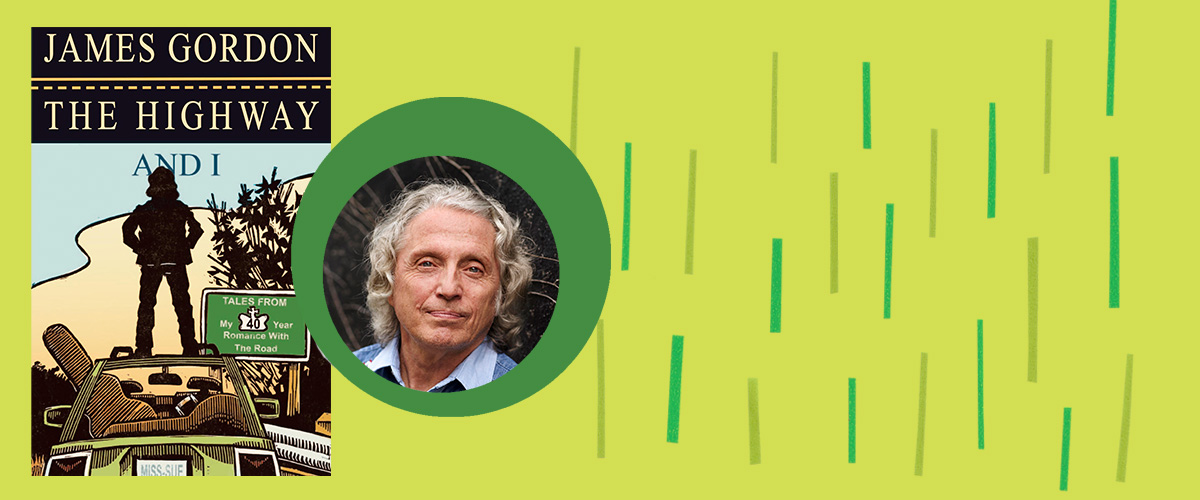
James Gordon
When I embarked on the novel project I was deliberately experimenting with a different sized ‘canvas’- suddenly I had the ability to expand on thoughts, take little side-trips, spin a yarn, really tell a tale. It’s very different, very exciting, and at the same time very intimidating.
What sparked the idea for The Highway and I?
My novel, The Ark of the Oven Mitt, was to some extent drawn from my own experiences as a touring musician. I’ve got a million ‘road tales’, and for the last 20 years or so I’ve been including one each month in my newsletter. After the success of the novel, it seemed like a good time to wrap all those stories up in bow and publish them too, as a companion piece to the novel.
Music is a huge part of your life as an artist and a major influence on your writing. What sort of music do you listen to while you write?
I NEVER listen to music as I write. Because I’m a record producer as well as a musician, I find it impossible to let music be ‘in the background’- I’m always wondering ‘how they got that bass sound’ or ‘what chord started the bridge section’?- things like that. I’m a terrible companion at a restaurant or bar since I’m always commenting on the background music that no one else even hears!
How does your approach to writing change when you’re working on prose versus writing song lyrics? Do you find one type of writing easier than the other?
I’ve been writing songs for more than 50 years now. It comes naturally to me. It’s an interesting medium because songs on average are less than 4 minutes long and have repeated choruses… so not a lot of words. You have to make the writing very economical. Get right to the point. And USUALLY you have to rhyme. It’s what our ears are used to in a song. When I embarked on the novel project I was deliberately experimenting with a different sized ‘canvas’- suddenly I had the ability to expand on thoughts, take little side-trips, spin a yarn, really tell a tale. It’s very different, very exciting, and at the same time very intimidating. I’m used to finishing a song in a few hours and then I get to ‘road test’ it right away. The discipline, patience and vision of a prose work is so much more intense! I think those two writing forms use such different tools that it’s hard to compare them. Writing a song is easy. Writing a GOOD song can be as challenging as writing a novel!
Your first novel, The Ark of the Oven Mitt was a finalist for the Stephen Leacock Medal for Humour. It’s a fictional tale inspired by your life as a musician on the road. How important (and how difficult) is it to tickle the funny bones of your readers?
Good question. Ironically, I didn’t set out to write a ‘funny’ novel. My intention was to use humour as a device to engage the reader. The Leacock acknowledgement was validation that this method worked, but it was a surprise to me that the book was then branded ‘humour’ and would be stocked as such in bookstores. Even in my former work as a politician or as an activist- I’ve often found that humour can be a ‘way in’. If I can make them laugh I’ve got their attention and we’ve made a connection. I worked as songwriter-in-residence for a CBC radio show, (Basic Black)- where I was required to write a ‘funny’ song every week. I had to learn how to toss them off quickly. My ‘non-funny’ songs are ones I often sweat and bleed over, yet the sillier they are the more memorable it seems, so I recognize the value of humour in writing and seem to use it unconsciously.
As a writer and musician, what is the best advice you’ve been given?
Hmmm. OK I’m using humour here. I worked with Ronnie Hawkins once and he said ‘Son, never take a gig that takes more than one day to drive to’! He was right. A real songwriting hero of mine was Ian Tyson. When I met him I was hoping for sage writing advice. He said “James, always carry a Sharpie with you”!
And on the flip side, what is the worst advice you’ve ever been given?
Run for city council. It’s just a part time job!
What do you hope readers take away from your work?
Hope is a key word in that question. I want to be a mirror for my readers. I want them to see themselves in my work in a way that inspires them. I want them to see their reflection in the fun-house mirror I create for them. My work on one level is all about community and its value, so it’s extra important for me to make a meaningful connection with my readers. Community is all about connection. And if I leave them with a sense of hope and a sense of wonder, -bonus!
